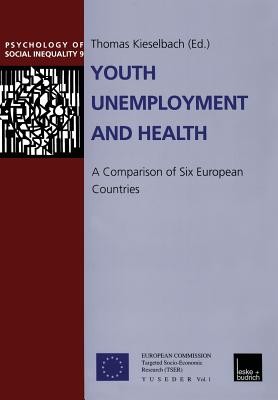
- We will send in 10–14 business days.
- Author: Thomas Kieselbach
- Publisher: VS Verlag für Sozialwissenschaften
- Year: 2000
- Pages: 232
- ISBN-10: 3810027626
- ISBN-13: 9783810027627
- Format: 17 x 24.4 x 1.3 cm, minkšti viršeliai
- Language: English
- SAVE -10% with code: EXTRA
Reviews
Description
Thomas Kieselbach 1 Object and organisation of the study The present volume contains the first results of an international research project on youth unemployment and social exclusion describing the most up-to-date research of youth unemployment and health in six European countries. The project Youth Unem- ployment and Social Exclusion: Objective Dimensions, Subjective Experiences, and In- novative Institutional Responses in Six European Countries (YUSEDER) is supported by the Research Directorate General of the European Commission (DG XII) within the Targeted Socio-Economic Research Programme (TSER) of the 4th Framework Pro- gramme. The YUSEDER research project tries to answer some crucial questions with regard to the risk of social exclusion associated with long-term youth unemployment. The European Commission launched a call for proposals looking for new know- ledge of the key mechanisms linking the experience of long-term youth unemployment to various dimensions of social disintegration, conceived of in the theoretical frame- work of social exclusion. In this context, not only the mechanisms exacerbating the stress of unemployment (vulnerability factors) but also the protective mechanisms pre- venting or reducing the risk of social exclusion have to be taken into consideration. The second research question relates to new options of institutional and political inter- vention and counteraction in different national contexts. These analyses will be underta- ken in three Northern European countries (Sweden, Belgium, Germany) and three Sou- thern European countries (Spain, Italy, Greece).
EXTRA 10 % discount with code: EXTRA
The promotion ends in 23d.07:06:48
The discount code is valid when purchasing from 10 €. Discounts do not stack.
- Author: Thomas Kieselbach
- Publisher: VS Verlag für Sozialwissenschaften
- Year: 2000
- Pages: 232
- ISBN-10: 3810027626
- ISBN-13: 9783810027627
- Format: 17 x 24.4 x 1.3 cm, minkšti viršeliai
- Language: English English
Thomas Kieselbach 1 Object and organisation of the study The present volume contains the first results of an international research project on youth unemployment and social exclusion describing the most up-to-date research of youth unemployment and health in six European countries. The project Youth Unem- ployment and Social Exclusion: Objective Dimensions, Subjective Experiences, and In- novative Institutional Responses in Six European Countries (YUSEDER) is supported by the Research Directorate General of the European Commission (DG XII) within the Targeted Socio-Economic Research Programme (TSER) of the 4th Framework Pro- gramme. The YUSEDER research project tries to answer some crucial questions with regard to the risk of social exclusion associated with long-term youth unemployment. The European Commission launched a call for proposals looking for new know- ledge of the key mechanisms linking the experience of long-term youth unemployment to various dimensions of social disintegration, conceived of in the theoretical frame- work of social exclusion. In this context, not only the mechanisms exacerbating the stress of unemployment (vulnerability factors) but also the protective mechanisms pre- venting or reducing the risk of social exclusion have to be taken into consideration. The second research question relates to new options of institutional and political inter- vention and counteraction in different national contexts. These analyses will be underta- ken in three Northern European countries (Sweden, Belgium, Germany) and three Sou- thern European countries (Spain, Italy, Greece).


Reviews